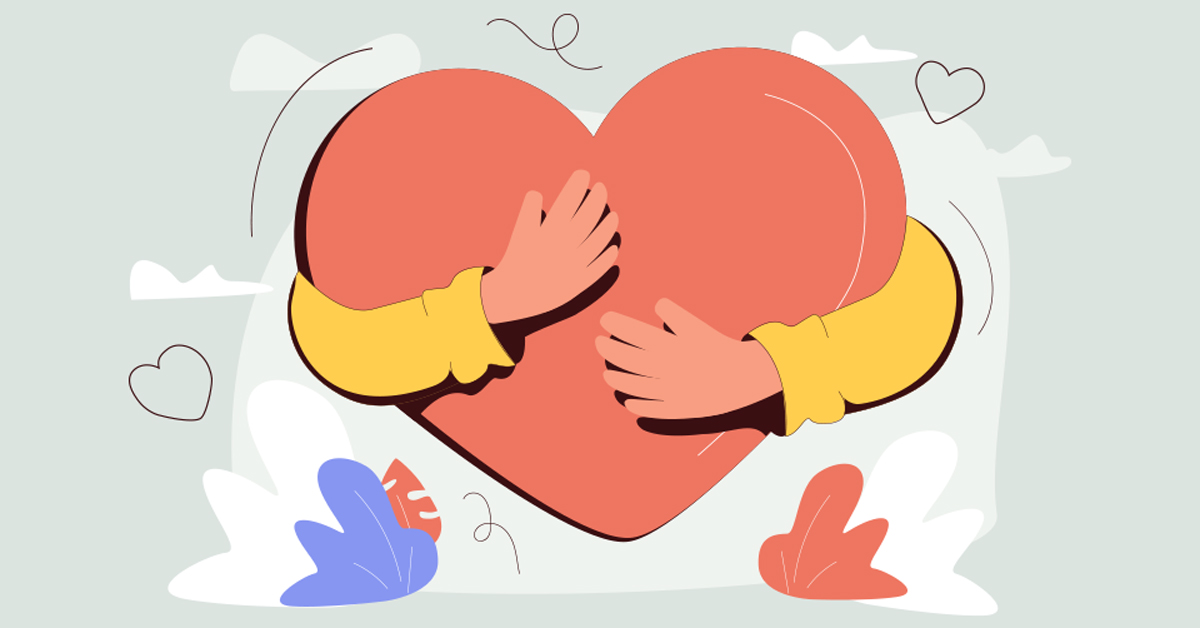In his latest blog, Mental Health First Aid instructor, Andy Elwood, turns his thoughts to love, and the importance self-love plays in our wellbeing.
A phrase that resonates with me is ‘be your own best friend’. I wrote a blog on this some time ago, which you can read here. You are the one person you’re going to spend all your life with and often we have the most critical voice of all in our own head. We say things to ourselves that we wouldn’t dream of saying to anyone else at all.
There are a few elements to being your own best friend.
First is having a pause, taking a moment to write down what’s in your stress container, which I mention in the blog, and recognising how you’re coping with that. Perhaps choosing something from the five a day for positive mental health.
If you’re dealing with difficult emotions, you could try the RAIN techniques. That’s Recognise what you’re feeling. Recognise what’s going on, Acknowledge it, Investigate it a little bit, have a think about it, and then just let it go, Not Identifying with it.
So, that mnemonic might help people if they are having difficult feelings or emotions, to get rid of them. And then if you are ruminating, catastrophising, or having unhelpful thinking habits there are some good questions to ask yourself: is what you’re thinking really true? Just a few simple questions. So that’s how to be your own best friend.
There are steps you can take in addition to these techniques. One thing is to create some time for yourself and do something you really love. Whether that is cooking a really good meal for yourself or something simple like creating a playlist. It’s very easy to achieve that on Spotify and you can create something that really motivates you and helps you feel good about yourself.
You could try spending time with someone special. Perhaps you could arrange an evening where you invite a friend, or a family member round, or you might feel you want to sit and be with just you and your pet on the sofa. Whatever it may be, try to spend some time with someone who is important to you.
Getting outside and looking after your body are also important. Doing a little bit of exercise will be great. And in the simplest terms, we should lead with our body. Our mind and our body are linked all the time and if we are finding it difficult and challenging this month, and we’re feeling a little bit alone, leading with our body will help our mind to follow.
One of the simplest things you can do is to smile really slowly, as slow as you can. It takes more muscles to frown than it does to smile, but we tend to frown more often. So, if we smile slowly and just focus on how our face is moving and how it feels, we can feel it, not just in our mouth, but spreading across our face. That seems to really lift our mood and lift up our mind.
Another option is if we stand up and straighten our back, lift our chin, engage our core, that can help our mood lift as well. Stretching is a really gentle, simple exercise. We can do that at the desk in a couple of minutes between meetings, or between patients coming into the practice. Just have a stretch. It’s a great way to get your mind off what was difficult, or challenging, what you’ve just done, or if you’re worrying about what’s happening this evening at home or at the weekend. Focus some time on yourself. Stretching has been proven to break the train of thought, to get us in a better place for the next thing we’re going to tackle.
I use a graphic where a person is walking around with an umbrella, even though it’s a sunny day, the rain is coming down just on them, and it’s like there’s a dark cloud over them. It’s one of the things I notice about myself, when my mood is getting low. My body language changes, and I tend to get a bit curled up and look down at my feet.
So, rather than saying ‘man up’, because that isn’t helpful, I think ‘chin up’. Thinking of being straight up, being proud of who you are, and chin up, gives us better vision and we can look towards the horizon. That means we’re looking up further than ourselves, we’ve got a better, brighter outlook of what’s ahead. So, think ‘chin up’, look out at what’s further ahead, what’s coming up for us, and what is good in our life.
Another simple thing I challenge people to do if they are feeling down, is to value what they have right now. The route to happiness and self-love isn’t a destination, it’s a whole journey. We can do this daily with the simple gratitude practise of writing down what we’re grateful for. This is really helpful. It’s proven to work to reprogramme our minds to think more positive thoughts.
To round up, I want to recommend a slightly quirky book, called ‘You Are a Badass: How to Stop Doubting Your Greatness and Start Living an Awesome Life’ by Jen Sincero. My favourite quote in there is, “Love yourself with a kung fu grip.” It serves as a reminder, there’s no one else more important than you.
About Andy
Andy Elwood is a Mental Health First Aid instructor and an ambassador for Movember. He creates safety and trust by sharing his own vulnerability and gives a unique ‘behind the scenes’ insight into life and death situations from his 20 years’ experience working in the emergency services as a paramedic on search and rescue helicopters.


